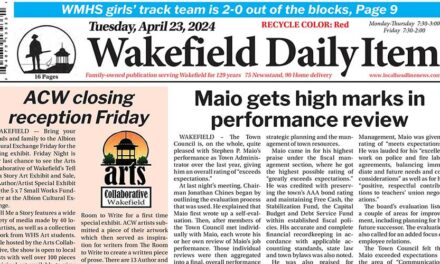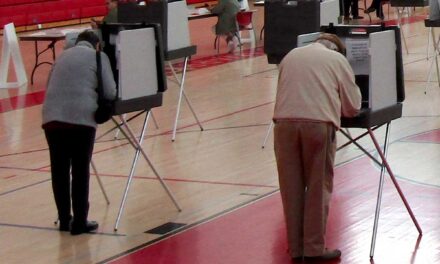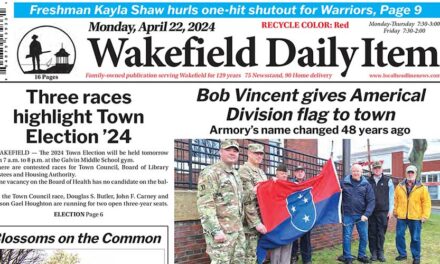(Although this is fiction, Gail has used some local people as characters in the narrative.)
By GAIL LOWE
The old man could have been anyone’s grandfather. Stooped at the shoulder, hair long gone gray, wattle under his receding chin, he wore his age like an old, worn-out suit.
He stood at the bus stop on Brookline Avenue, huddled into himself against the bracing cold wind like an old dog against a cruel master. Hands stuffed in his pockets, his fingers worried the silver coins he would soon drop into the coin change dispenser. The bus driver had told him about some kind of card he could buy that did away with the need for cash, but Jacob Levin was a creature of habit. He liked using the coins stored in the big kosher dill pickle jar on top of his bureau. The jar was filled mostly with quarters but there were dimes and nickels in there, too. No pennies, though. He wrapped those and took them to The Savings Bank when he had enough. Always got a hearty welcome from Brian McCoubrey. The pennies helped with his grocery bill. Every cent counted. That’s what had been drummed into his head when he was a kid.
Today, he had taken the bus to Boston to see his doctor at Beth Israel. Ever since his triple bypass three years ago, he had to see his doctor a few times a year. So far, so good. And today Dr. Aboud had proclaimed the old man healthy as a camel. Jacob had stifled a laugh. He had wanted to correct the doctor. Tell him that in the U.S. of A. people were as healthy as horses, not camels, but he didn’t want to offend the man. And so, Jacob smiled to himself when he left Dr. Aboud’s office. He thought about what he’d tell his friends the Mezikofskys and Abe Kaplan, who lived next to him in the rooming house on Main Street.
“How’d your doctor visit go, Jacob?” Abe would ask. And he would respond, while tipping his red plaid woolen cap, “I’m as healthy as a camel. That’s how it went.” And he knew Abe would look at him funny and go back inside his room, scratching his head.
The bus loomed up ahead, having rounded the corner. In a minute’s time Jacob would warm up. Maybe he’d ask the driver to let him know when he came to his stop so he could nod off. It was late afternoon and he’d missed his nap. Yes, that’s what he’d do. Take a little cat nap on the bus. Then when he got back to Wakefield he’d have the energy to cook a little something for dinner. Open a can of beans and cut a few slices of liverwurst to put on a piece of pumpernickel. He climbed aboard the bus, one step at a time, his right hand holding fast to the metal grab bar to help him up. He heard the rustle of paper bags behind him and the voices of two women. He turned to take a look. One was about 40, the other about 60 or so. The first had curly shoulder length hair the color of dark chocolate. The older one had a short spiky haircut. She’d let the color go gray. He shuffled along the aisle to the middle of the bus and sat down next to the window. The two women followed and sat in front of him after storing their bags on empty seats across the aisle. Jacob closed his eyes, rested his head against the cold glass window and thought about nothing.
He was about to nod off when the younger woman spoke.
“All I can say is that I miss the good old days.”
The spiky-haired woman laughed. “Wait till you get to be your mother’s age.”
“I know, Mom, but it’s true. There’s nothing like the good old days. You know … like when I was at Wakefield High and could buy an entire outfit for 50 dollars. You probably don’t want to hear this but I spent my entire pay check on what’s in those four bags.”
“Well,” said the mother, “I can remember when an entire outfit cost me 30 dollars, and that included a pair of shoes.”
“Where’s it gonna end? Prices can’t keep going up or we’ll all be in the poorhouse.”
“I hate to tell you this, sweetheart but prices will always go up. It’s called inflation. The good old days are long gone.”
By now, Jacob had tuned in to the conversation but the women said nothing more, so once again he closed his eyes. But this time he thought about something. While the bus bumped along the pot-holed street, Jacob thought about his youth and wondered if the women would think they had been the good old days. He was born in 1928, a full year before the stock market crashed and the Great Depression took hold. A few years later, people ate lard sandwiches for supper and stuffed newspapers in their shoes to keep their feet from freezing. If they chose to live. Too many didn’t and they leaped off tall buildings to escape the truth of their empty bank accounts. He wondered what the women would think if he told them he had relatives who’d been shipped off to places with odd-sounding names. Places like Auschwitz, Treblinka and Ravensbruck. Jacob considered himself one of the lucky ones. Just two months before Hitler activated his master plan to create a pure Aryan race, his father had gathered the family together and told his mother, sister and brother they were leaving Germany. “I have a trade,” he said. “People in America will need a cobbler to fix their shoes. I know I’ll find a job as soon as I get there. Maybe one day I’ll have a shop of my own.”
As soon as the family’s paperwork was in order, they left on a liner and braved the rock and roll of the ocean journey inside a steerage room. His mother had been seasick the entire time and he could still remember the sound of her heaving and retching. His father had placed a wet cloth on her forehead and asked the children to play quietly.
“Your mother is having a hard time of it,” he explained gently. “We need to help her through this. Soon you’ll running and playing on the streets of New York City. Oh, the sights you’ll see.”
Jacob and his sister and brother had obeyed. Even as a kid, Jacob had an enormous capacity for empathy, especially for his mother. A week later, they stood on the deck of the liner and watched as Lady Liberty came into view. Jacob remembered the shivers that went up and down his spine and they didn’t come from the cold. He wondered what it would be like living in this new land. He soon found out when an official at Ellis Island changed the family’s last name from Levinson to just plain Levin. Jacob Levin. It rolled off his tongue like a spoonful of honey. The family didn’t speak a word of English but there had been a translator who directed them to the Lower East Side where they found tenement housing. If he thought long and hard enough, Jacob could conjure the smell of cabbage boiling over on the stoves in neighboring apartments.
Two months after their arrival in New York Jacob’s father was still having trouble finding a job in a cobbler shop and wore out his own shoes walking the streets of Manhattan. Up and around Broadway he went and all the side streets, too, and he even considered going into Harlem until he told a neighbor his plan.
“Don’t go there, Karl. It’s not safe. Stay out of Harlem. Trust what I say about the place. It’s trouble,” the neighbor warned.
Jacob’s father had taken the neighbor’s advice. But when the new baby was about to be born, the family couldn’t afford a doctor to attend the birth. Jacob was sent outside with his sister and brother, and while sitting on the front stoop they could hear the agonizing screams of their mother three flights up.
The neighbors had taken pity on the family when both mother and baby died during the birth and they took up a collection to help with the cost of burial. Both were buried in a pauper’s grave in First Shearith Israel Cemetery. Jacob’s father never recovered but he did find work. And every night when he came home, his face haggard and lined from grief and lack of sleep, the family sat at the supper table in silence.
“Please pass the bread,” and, “Could I have more milk?” were the only words spoken. No longer was a blessing said.
Jacob thought about these things while the two women resumed their conversation about the good old days. If only they knew, he thought.
When Jacob’s father died, he, too, was buried at First Shearith. And one by one, his brother, sister and then he, himself, grew up and married.
Jacob recalled his own wife. Ruth had been a good woman. Also from Germany, she had been a seamstress and worked long hours in a sweat shop making fancy blouses for women who could afford to pay top dollar while Jacob cobbled shoes, just like his father. Ruth had given up those long hours when their firstborn, a son they named David, arrived.
Jacob had warned Ruth about spoiling the boy but she hadn’t listened. She bought him every toy, every piece of clothing, every movie ticket his heart desired. He knew it wasn’t a good thing to do but Ruth had done it anyway. And when she lay dying of cancer David was nowhere to be found. Even now, Jacob had no idea where his son was. Hadn’t seen him in more than 20 years. He wondered what the two women seated in front of him would think about that.
Jacob leaned his head against the cold, hard window and rested his mind. The women had stopped talking and soon he was asleep. The film starring his son started to roll inside his head. In his dream, Jacob saw David passing by the shop where he had once worked. But by the time he got to the door, by the time he opened it and stepped onto the sidewalk, his son had disappeared into the crowd. He cried out David’s name but his voice was lost in the wind. A moment later he felt someone tugging at his arm.
“Are you OK?” he heard a woman say. He opened his eyes. The spiky-haired woman was staring him in the eye. “You called out for someone named David,” she said.
Jacob straightened himself. “I’m fine. I must have been dreaming. Sorry to have frightened you. I have no idea who David is,” he said.
It was true. He didn’t have any idea who David was. He had at one time. But now? No, he didn’t know who David was anymore, didn’t even know if he’d recognize his own son if he walked past him on the street.
He saw that his stop was just up ahead. There was the Salvation Army bell ringer standing on the corner of Main and Richardson. Susan Majeski pushing a cart full of poinsettias across The Farmland’s parking lot. There was Wendy Dennis going into the bank and Nancy Bertrand crossing the street lugging a big silver urn. Janine Cook pulling up to the curb in her car. Brian McGrail walking along with a briefcase. Bob and Merry Eldridge getting into their car. And there were Dan and Caroline Lieber. He planned to have dinner with them Friday night to celebrate Hanukkah. And wasn’t that Andy McRae turning the corner onto Albion Street? Looked like he was carrying a brown leather jacket under his arm.
The old man stood up. Glanced at the two women on the bus. This was his life now. These were the people he knew and loved. These were his neighbors, his friends, his family.
“Someday — maybe 20 or so years from now — you’ll hear someone longing for the good old days,” he said to the women. “I’m glad I won’t be around then. The way the world is going, there’s no telling what it will be like.”
The two women gave him a sage nod. But did they really understand? Or did their world begin and end with Christmas shopping?
Jacob wondered this as he made his way down the aisle. He wondered about it all the way home.




